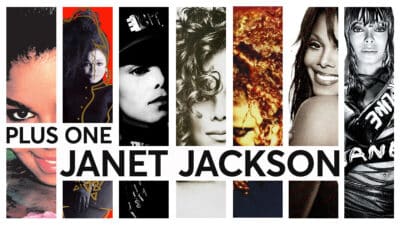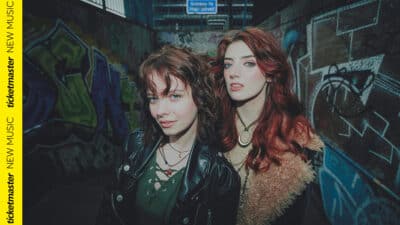Interview
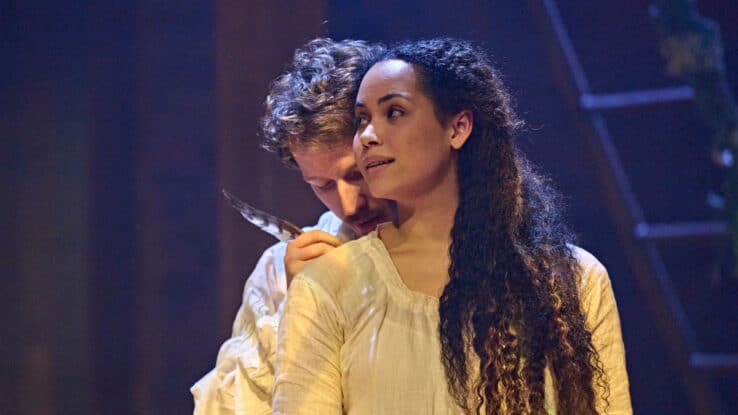
Interview
Hamnet in the West End: “of course, Shakespeare was just a man”
Playwright Lolita Chakrabarti and actors Tom Varey and Madeleine Mantock discuss bringing Shakespeare and family to the stage
When it comes to historical figures that everyone has some kind of preconceived idea of, William Shakespeare is pretty high on the list. He’s one of those names that has long since ceased to be attached to a real human being and is instead a concept, a study, an entire chapter of British history. This was the challenge faced by Maggie O’Farrell in the writing of her novel, Hamnet, and by the cast and creatives of the stage version. To deliver a story about Britain’s most famous writer that would surprise them, grip them, and separate Shakespeare the Bard from the Shakespeares: a real family with children living in Stratford-upon-Avon.
Hamnet is not a play about Shakespeare the writer. Those lucky enough to catch its first run at the Swan Theatre in Stratford instead witnessed a story about love, sacrifice, grief and unimaginable loss. And they met Agnes, introduced to us as she has never been before. As the production prepares to open at the Garrick Theatre on the West End, we caught up with playwright Lolita Chakrabarti and actors Tom Varey and Madeleine Mantock to discuss the joys and challenges of bringing O’Farrell’s book to life.
What was your reaction what you first read the book?
Lolita Chakrabarti: Amazing. It’s a beautiful, surprising piece. I didn’t know anything about it, so I read it without any prior knowledge or any words of anybody else in my mind. And Maggie O’Farrell is such an amazing writer, she just says things so succinctly and so movingly, and so currently, but with historical feeling behind it. And it’s just brilliant because there’s so many women in it.
Tom Varey: I cheated. I did the audiobook. But I’d already got the job at this point and I’d read the play. So yeah, I thought I’d bash out the audiobook. Yeah, I loved it. I thought it was so sad and felt weirdly modern and it was really interesting to just see… Obviously, there’s so much chat about Shakespeare but it was nice to see the family life of Shakespeare and those dynamics.
Madeleine Mantock: I read Lolita’s adaptation first, so that was my first meeting with it. I immediately had this wash of emotion. Sometimes when you get stuff to read, it’s a bit of a slog, and but I just sort of flew through it and thought, “Oh, gosh, I feel really connected to this. I’ll never get to do it!” I kind of came at it from the other end. And then when I did read the book… I didn’t read it until I knew I had the job, because I didn’t want to get more emotionally invested in case I didn’t. It’s interesting when you’re reading something, and you’re also mining it for information. So I mean, I loved it, as everybody does. But I definitely was reading it with a bit of like, “How can I use that?”. I was really on the lookout. So I want to read it again now and see if I can read it with a bit more distance, almost. When you’re reading it to try and get everything you can out of it for a specific purpose, it’s a different experience. But I mean, I thought it was beautiful. I can see why everybody loves it.
It’s been a quick turnaround on this project as well; the book came out less than four years ago, and it was almost straight to stage. Lolita, when did you first become involved in this project, and what was that journey like of bringing it to the stage?
LC: This was a relatively quick commission. Like you said, because the book hasn’t been around for very long. Our director loved it, when she read it in lockdown. She just loved the book, and just thought it could make theatre. I was approached about it in 2021, and then I began writing it last January. But it was pretty quick. I had a year. And I thought, “Oh, my God, that is fast, actually.” It took me longer than I expected. Normally a first draft of something takes me six weeks. You know, I think and think and think for months, and plan and imagine. But the actual writing takes about six weeks. And this took me 10. Maybe I didn’t have enough digesting time, but also, it’s just a huge responsibility telling a story that everybody feels like they know, from a book that everybody loves.
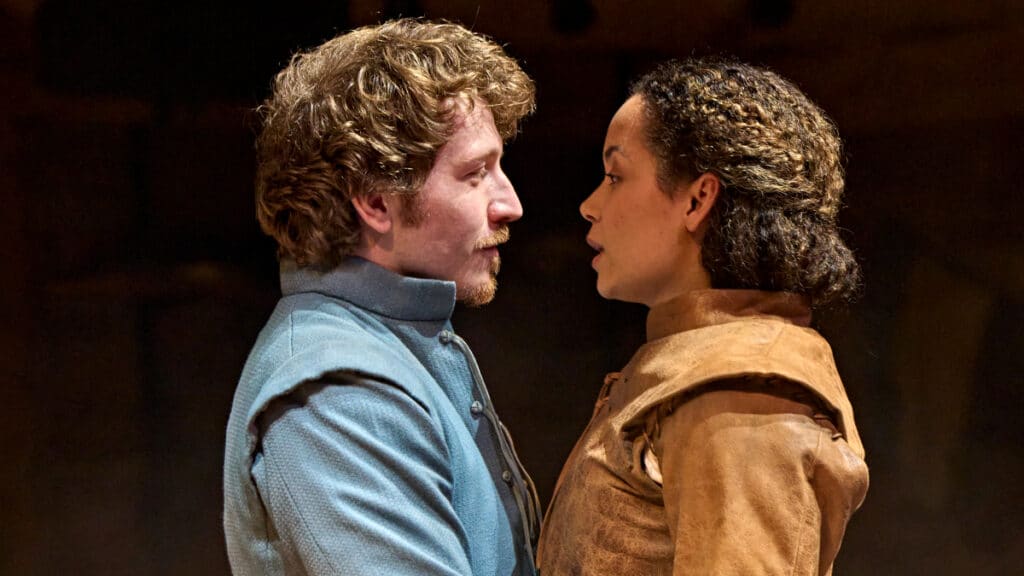
You’ve adapted some very beloved texts in the past – how did this experience compare?
LC: They’re all really different. And I don’t have a method. I mean, I probably do have a method, but I don’t have a method – I just sort of follow the story. And the other books that I did are older. I did Invisible Cities, which is this epic, older, weird novel, and then Life Of Pi, which is over 20 years old. But because this was current and new, the heat behind it was more apparent. Those books are loved and people go, “That’s a seminal novel from my childhood,” or whatever. But this, everyone was like, “Oh, my God, this is so exciting…” So the pressures were different. And the book is very internal and about nature and healing and thought and feeling. And how do you put that on stage? You translate some of those elements into people and what motivates them to do what they do. I guess the baseline is the same, but each one demands different things.
And as you say, this is a story that people feel like they know. And Shakespeare and Agnes are fictionalized versions of real people, who everyone obviously has their own ideas about. Tom and Madeline, could you give me an overview of your versions of these characters?
MM: I think when I try to get to the essence of who Agnes is, I see her as this sort of… she’s a whole person, but she’s split. And that’s the thing that makes her interesting. She has this really earthbound quality. She’s a herbalist and she has that really tangible relationship to the earth. But she also has this other side of her that’s up here. She’s really complete, and I think that’s the thing that I enjoy getting to play about her.
But also, the other side of it that I really like – and I think maybe this is true for both characters – is that you get to see where they start, and they’re both in quite unhappy homes and the relationships that they have to authority figures is quite strained. I enjoy that journey in the beginning, getting to play someone who kind of meets their match, and then they see a little a little window to jump through together, that propels them into young adulthood.
TV: I have an idea of what Shakespeare means to me and how I see him as a person. And I see him as someone who’s a little bit dreamy… a dreamer, not dreamy. That’s different! A dreamer, someone who is fascinated with words, fascinated with knowing things, and fascinated with people and is completely like, intoxicated with Agnes because he’s never met anyone like her. And he just finds her so interesting, and he’s so curious about her.
MM: Is she dreamy?
TC: She is dreamy. He’s a dreamer, she’s dreamy. I liked how he’s never named in the book, he’s always “Latin tutor”, or “father”, or “husband”, or something like that. So it was nice also to know, functionally, the part that he is in this story. I’m not doing a Shakespeare biopic, so I don’t have to worry about how Shakespeare does things. I’m just telling part of a much bigger story.
It’s nice to see something about Shakespeare that is not completely focused around him, but instead around his peripheries and particularly the woman in his life. What were the priorities for all three of you in telling this story?
LC: I suppose it was to honour Maggie’s book. She gave me the characters and she gave me what happens and where it begins – kind of its middle, and its end. My priority is always: “why do these people do what they do, and how do they feel about it?” It has to change. In each scene it has to change, in each half it has to change, and in the whole thing has to change so that they travel emotionally, physically and mentally. It’s a case of being true to the situation that I’m given by Maggie’s book, choosing the bits that I want from her book, because obviously there are loads of brilliant bits I left out, and then making us feel for them then. It has to have a current feeling in it. Losing a child is sadly a universal thing that happened a million years ago and happens now, you know, so that it has to be true for anybody who watches it across time.
TV: The main story for me was the story of love and how that love is changed by tragedy. Making sure that we feel a complete story of these young people falling in love, and seeing that love blossom into something really quite wonderful. And then this tragic thing happening and how they slowly deal with it in different ways, and they start to drift and things start to change.
MM: I don’t know if I have a priority because my brain just goes, “All of it.” Everyday, I try to think, “Okay, what is the best, most interesting, most truthful, complete way to tell this story for the new audience that we have today?” And I used to say to Erica (Whyman), our director, this analogy of feeling like I was on a train. Each scene was just a stop, but I had to hit them, and I had to be the vessel for that scene in the best way that I could before moving to the next step. I remember there was definitely a day where we did our opening scene, and it was the best we’d ever done it. And we were like, “That was it. If we could do it like that every time…” Like, that was the perfect take. But this is not like that, because it changes every night; you have a different audience, they respond to different things. I try to have the most complete version of the story, and to honour it all in the best way that we can, so that whoever’s watching that day, the stuff that pings out to them will shine for them. But there’ll be loads of those moments so that there’s something for everybody.
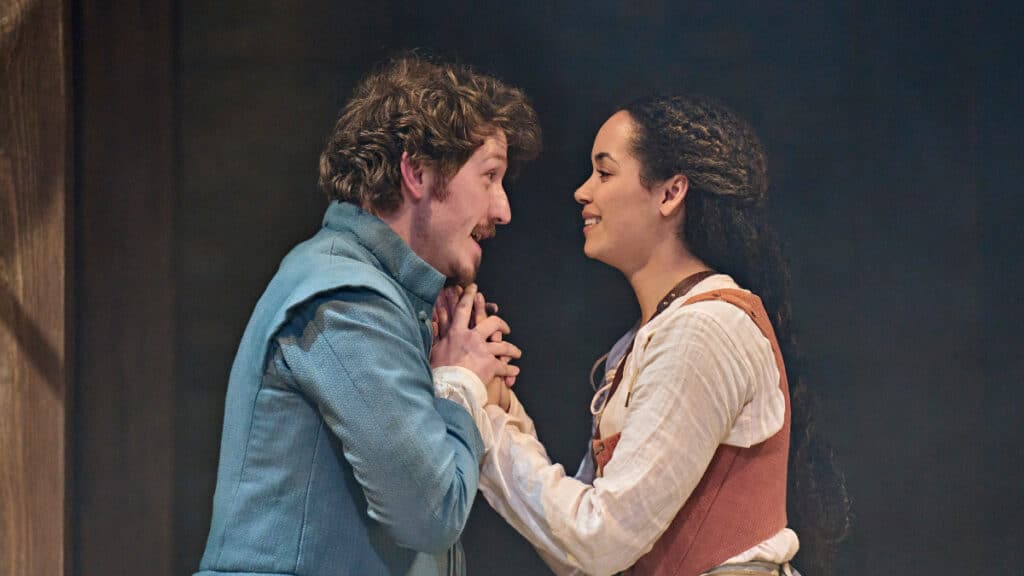
What was it about that night that made that opening scene feel so spot on?
MM: If you get all the right dynamics, it’s interesting… because I always think, when you’re with a scene partner, or even more than one scene partner, it’s like you’re playing tennis. How do you send that ball back? Did you catch it just in time? I don’t really remember what it was that we did in that scene that felt so good… but it’s like you’re communing with each other in the scene. When the audience are enjoying it in a way that kind of elevates it too. That’s what’s so exciting about theatre. You come off and it just feels electric.
TV: There was one other night… We have these trays with apples on. I get pushed into the tray and it goes sort of off the table, and apples fall everywhere. I have to leave the tray, so I leave Agnes to pick up the apples. And one night, as I left the tray and turned around, I could see that the tray was tipping off the table. So I swung back around and caught the tray and Madeleine caught the apples.
MM: My Spiderman moment!
TV: It was totally not really what the scene was about at all.
But I bet the audience that night were like, “Wow, these characters are so just so connected…”
TV: Yeah, it got a good response.
MM: I think they gasped.
TV: We were like, “Should we try and put that in?” But we couldn’t recreate it.
LC: I think that’s the beauty of live performance though. You can’t recreate the brilliant night, but you build on it a different night and do something else. So it’s interesting, you can’t remember what you did. That’s the point it; you travelled with it.
I want to go back to what you all touched on – the idea that you’ve got to find what’s current about this story. Do you think it’s that thread of grief that keeps this story so connected to modern audiences?
MM: I think it’s one of the things. I remember being in Stratford and getting a message from a group of bereaved mothers who had met because of their circumstances and had come to watch our show. I think they wanted to take the day to honour their children, to honour Hamnet and Judith, and come and see our show and share that experience together. So there’s definitely that element. But there are multiple themes throughout the show that are timeless, whether that’s the falling in love, or the upsides and the downsides to what a family’s influence can be. What people’s work means to them. One of the things that I think is really beautiful is that we show there’s not one way to grieve somebody. And even though in the beginning it might seem quite cold and harsh that William has to leave to grieve, you see that he’s able to turn it into something really beautiful that has lasted. I definitely think that the fact that we provide a space for people to express their grief is why it’s popular. But I feel like there are all those other elements as well that will always be a part of life.
LC: It covers a lot of life. Exactly that. It covers 18 years. Children are born, one child dies, people are sick, people are frustrated, people get release, people move, there is economic need, money coming in, success, sadness… it covers so many things that all of us will suffer, all of us will have in our lives no matter when, at some point. Definitely in my head, I think, “Oh, Shakespeare, right. William Shakespeare who has all these marvellous plays. Gosh, I have to be a bit in awe.” But of course, he was just a man. And he had a wife, and they had children, and one of their children died. And it affected them. And he ended up writing this play that has lasted 400 years. There’s all this academic analysis of who was he in this play, and what does it mean? But Maggie’s joined that to the death of their son.
And it’s about creativity, right? They made this child. Agnes, Anne, was instrumental in that. And it’s been so forgotten, because we go “Oh, Shakespeare was a genius, she was just his wife, and he didn’t really live with her.” But they created this child, and then he went on to create this extraordinary piece of art. I think, I don’t know, suffering leads somewhere. It covers so many things that we are all living through, particularly after COVID.
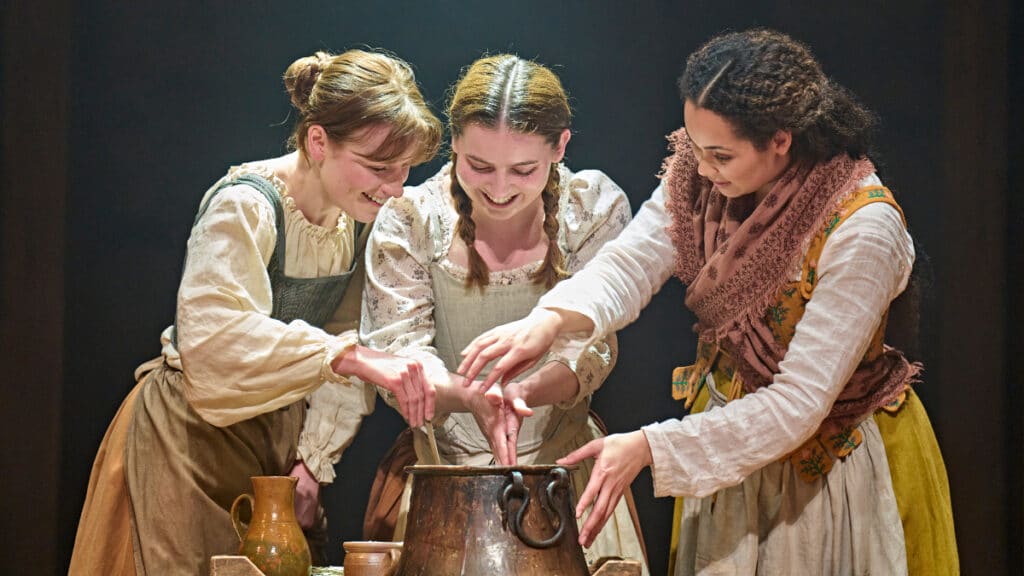
I think one of the prevailing narratives about Shakespeare, as you touched on Lolita, is the idea that he was absent a lot from his family, that he’s off doing his thing in London all the time. How do you feel about this interpretation of Shakespeare as an absent father and husband?
TV: Well, I think that that’s incredibly interesting to play. What I think about personally about being an absent father…
MM: Well, do you think he was?
TV: He probably was – he missed out on a lot of a lot of his children’s lives.
LC: I think it was different though, then, right? Now we’re all, “Everybody needs to be at home, and everybody needs to share everything, and we all need to take the kids to school and cook together.” Life now is a different thing. Whereas then, you know, men and women, their jobs were very divided. I always look at Shakespeare – and maybe that’s why I’ve modelled it a bit like that – as an economic migrant. It’s like an immigrant really – he goes where the work is and it’s necessary. And I think he’s doing his part of his job, which is to send money back home, so that his wife and kids are fed. I don’t know if he’s an absent father. Physically, yes. We want our dads all to be here in the playground. But then, it was a different deal. He earned the money; she looked after the home. That was a fair, even good partnership.
What’s the process been like of bringing this production from Stratford to the West End?
TV: Well, it’s a totally different space. So that’s been something that we’ve all had to be getting used to this past week and a half.
MM: We just have different entrances and exits, and all of your eye-lines are a bit different because people are in different spots. It’s just kind of getting used to a familiar story that has been tweaked and elevated. And so it’s this familiar but different thing that we’re just trying to kind of remember and piece together but also leave space to find new things for.
TV: Yeah, I mean, I don’t want to jinx anything, but this is the most prepped I’ve ever felt for a job in my life, which is really nice. Because we’ve lived it already. We have the luxury of having done it all, explored different things, and now those things are still in us, and we can think about, “What else is there?”. Now I’m thinking, is this the amount of prep you have to do for every job?!
LC: It’s a real privilege to do it again. It was a new play in Stratford. and there’s always holes and things you miss and things that you didn’t do. And then there’re words that actually you can feel a character wants to speak, but they don’t have the lines. Or they speak too much. So it’s really lovely to go back and tweak it and change it and write things in that weren’t in the Stratford version. And the Garrick is, I mean… there’s nothing like a West End theatre. Stratford was wonderful, and it was amazing to do the Shakespeares at home, literally at home. But here we are in the Garrick Theatre. And Garrick was the actor of old who brought Shakespeare to light, you know, and was the one who championed him all that time ago. There’s a lovely sense of history.
What is it about this production that makes it so special to each of you?
MM: My favourite thing is the people, the cast that we have. I go in the rehearsal room, and I see all of our little dynamics and the friendships that we’ve built, and it makes it really enjoyable and easier to do what can, at times, be quite a difficult piece. I definitely feel that. Sometimes I go, “Gosh, if I wasn’t doing it with you, this would be a nightmare!”
TV: Mine’s the same answer, the people, and everything about this story. It felt really special when I first read the play and it feels even more special now.
LC: I like the opportunity, through Maggie’s book, of reframing history a little. Often the people that I really want to hear from don’t speak in the things that I’ve seen or aren’t there. I love it that the people who really could tell me who Shakespeare was are all around him and telling me in relation to him and through each other who this man was. Having studied Shakespeare since I was 15, I loved meeting them.





